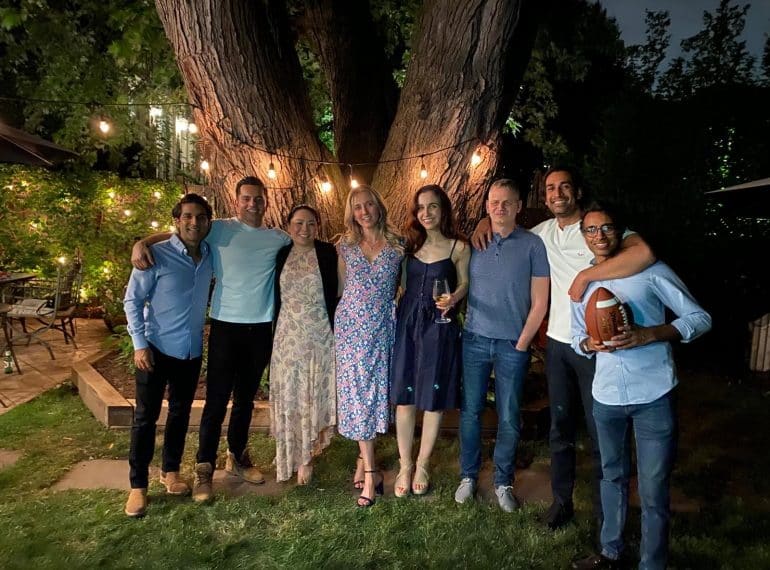
Medic Neeral Patel is loving life in Toronto, where he is on a two-year mixed research and clinical fellowship – even if, at first, he wondered if making the move had been a big mistake.
“I vividly remember landing in Toronto a year ago with a very uneasy feeling in my stomach, thinking ‘what on earth have I done?’ Life in London was relatively comfortable, and I had left my family, friends and partner, Jasmin, in the UK. I was certainly excited about the opportunity, but naturally quite apprehensive at the very beginning.”
He fell back, however, on the lesson imparted on his first day at QE by his Headmaster, Dr John Marincowitz, who recited a quotation attributed to Confucius in a talk to the new boys: “Man who stand on hill with mouth open will wait long time for roast duck to drop in.”
“One of the lessons I’ve learnt along this journey, particularly related to training, is that it is necessary to force yourself to leave your comfort zone in order to progress,” says Neeral (OE 1999–2006), pictured above with his co-fellows in Toronto.
After leaving QE, he studied Medicine at Imperial College London from 2006–2012. He was vice-chair of an outreach programme called Vision, which ran conferences for secondary school pupils aimed at widening participation in Medicine. “Sometimes talented students just need a bit of advice and direction which they may not otherwise be exposed to, in order to reach their aspirations.”
As well as making life-long friends at Imperial, the highlights included his elective in Kilifi, Kenya, at the KEMRI-Wellcome Trust facility under the tutelage of Professor Kath Maitland: “She has done great work on malaria and malnutrition in the region.”
An opportunity to travel around South East Asia for five weeks with friends got off to an unfortunate start when he was put into isolation in a public Bangkok hospital for a week with H1N1 flu (during the 2009 pandemic). But after making a full recovery, Neeral re-joined his friends and visited Cambodia, Vietnam, Laos and Borneo.
His biggest inspiration at university was Professor Simon Taylor-Robinson, a hepatologist with an interest in translational research – in particular, imaging techniques to assess liver disease. “Undertaking my BSc project under his mentorship initiated my interest in medical imaging.”
After university, he moved to Birmingham for two years to undertake Academic Foundation Training, which is a dedicated programme for those who may wish to pursue a mixed clinical and academic career.
He then returned to Imperial College NHS Trust in 2014 for clinical radiology training, during which he developed his nascent interest in interventional radiology – “an exciting field in which minimally invasive techniques are utilised to treat a spectrum of diseases across a range of body systems using image guidance, whether that be fluoroscopy (x-ray), ultrasound, computed tomography or magnetic resonance imaging.”
Certain diseases for which surgery was the only previous option – with associated morbidity and mortality – can now be treated through a pinhole in the groin or wrist, using catheters and wires.
“The list of minimally invasive procedures offered by interventional radiology is endless and ever-increasing as new medical devices are innovated. Ultimately, patients are almost always able to go home the same day with no incisions, improving quality of life and reducing the risk of potential complications.”
Through his research interests in the subject, he has attended and presented at conferences in cities across the globe including Lisbon, Barcelona, Dubai and New York.
“During my time training in London I continued my interest in outreach by co-organising a careers day with the Royal College of Radiologists and Imperial College London for students interested in medicine. Those attending were exposed to hands-on activities related to diagnostic radiology, interventional radiology and clinical oncology.”
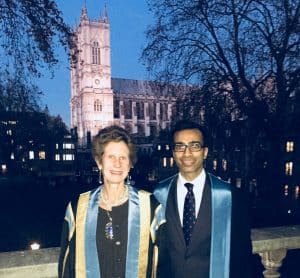 The photo shows him with Professor Nicola Strickland, past President of the Royal College of Radiologists and one of his consultants when he trained in radiology at Imperial.
The photo shows him with Professor Nicola Strickland, past President of the Royal College of Radiologists and one of his consultants when he trained in radiology at Imperial.
Having completed diagnostic and interventional radiology training in London, the opportunity came to go to Canada. “The benefit of doing training in another country includes experiencing a completely new healthcare system and, particularly with procedural specialties, developing new skills and learning new techniques which I can then bring back to the UK in my future career as a consultant. Enjoying the new culture and all Toronto has to offer is, of course, a bonus.”
He soon overcame his initial qualms. “Having lived here for a year now, Toronto is a fantastic city, very diverse, with an excellent food scene. The national dish, poutine, is a particular favourite – how can you go wrong with chips, cheese and gravy! There are also great ski slopes very close by. The summers are glorious; however, the winters can be harsh, reaching -20C! The natural beauty of Canada is incredible, perhaps Banff and Whistler being the most well-known spots to visit, but other areas such as Newfoundland, Quebec City and Nova Scotia also have their own charm.”
Prior to the pandemic, he was able to fly back and forth at regular intervals to see friends and family. While Covid-19 has a huge impact on healthcare workers across the globe, he is complimentary about the Canadian government’s handling of the pandemic. “Although anxiety levels have been palpable within the hospitals at which I work, particularly at the height of the pandemic, we have seen incredible acts of kindness and a real coming together of the profession.”
Now that Canada is past the peak, he reflects, “the research and clinical experience I have gained here has certainly been exceptional and worthwhile.”
Neeral cherishes very fond memories of his time at QE. Among the highlights were:
- “A School trip to Russia, which was huge fun and included seeing the Moscow state circus, getting the overnight train from St Petersburg to Moscow, and attempting to order a McDonalds in Russian.”
- “Playing for the cricket First XI in the Sixth Form (without question, to make up the numbers).”
- A Nuffield Bursary summer placement at the National Institute for Medical Research in Mill Hill, where his work on a project investigating novel TB vaccines helped to foster an interest in medical research.
He attended his ten-year School reunion dinner in 2016. “It was fantastic to catch up with many old classmates, some of whom I hadn’t seen since leaving QE, and great to see the diverse career paths taken, from social media influencers, start-up entrepreneurs and music producers to leaders in the arts, law and science.”
Neeral also visited QE to give a talk to sixth-formers who wanted to pursue a career in Medicine. “I spoke specifically on my specialty of interventional radiology, which is a field many aspiring medics may not necessarily have even heard of, and so I wanted to give them a flavour of what we as clinicians can offer patients in the modern era.”
“On a brief tour, it was impressive to see how far the School has come under the leadership of Mr Enright, both in terms of academic achievements as well as new facilities, in particular the swimming pool – I remember the days of swimming in the old, damp and cold pool in the winter months, an experience I really wouldn’t want to relive in a hurry! It was also great to meet some of my teachers again, including Mr [Mev] Armon, Dr [Malcolm] Russell and Mr [David] Ryan who were, and still are, first-class educators and mentors.”
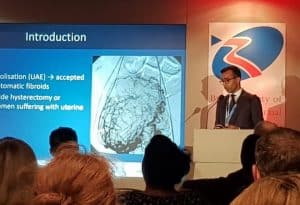 He has been pleased to see leavers in recent years take up offers at US and Canandian universities, including, most recently, Aly Sayani, who has won a place at the University of Toronto.
He has been pleased to see leavers in recent years take up offers at US and Canandian universities, including, most recently, Aly Sayani, who has won a place at the University of Toronto.
Neeral heartily recommends that younger Elizabethans consider Medicine: “a fantastic career with a specialty to suit all interests and personalities, with opportunities across the globe, whether it be a developed or developing country. It is a truly transferable career path, and some of my friends have even left clinical medicine completely to take up positions in healthcare technology and consultancy firms.”
In conclusion, he says Dr Marincowitz’s strictures about roast duck still resonate with him to this day: “I am grateful to QE for nurturing their students to seek and make the most of all opportunities that are presented in life.”
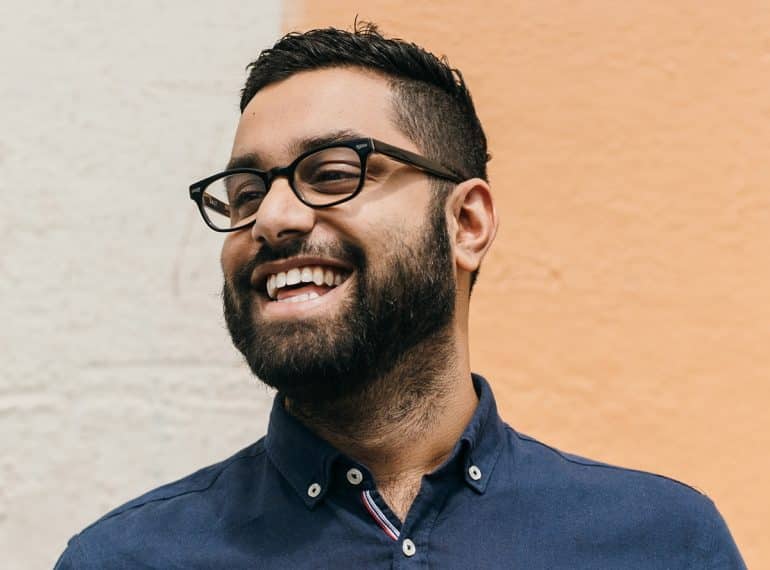

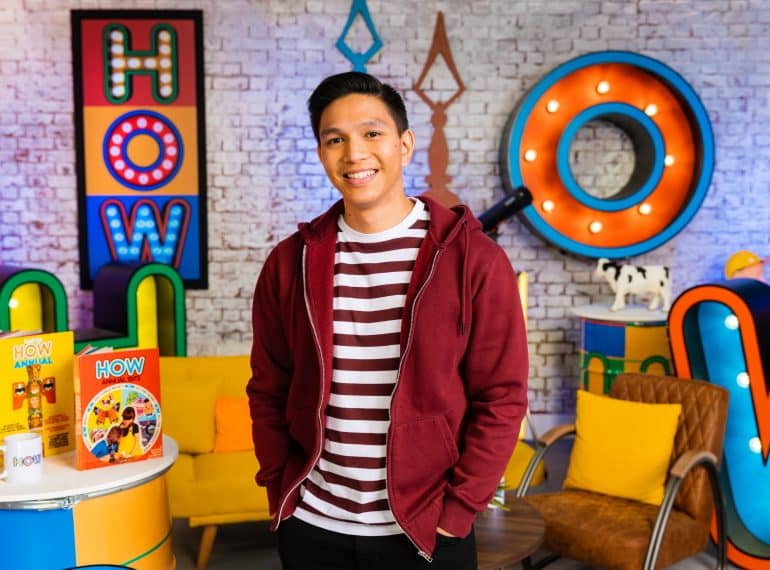
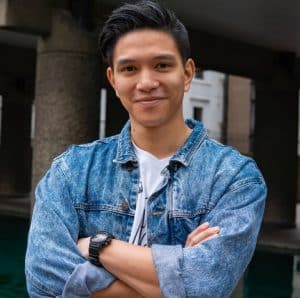 ITV have revived the educational programme, with Frankie (Francis) among the team of four presenters. HOW originally ran from 1966 to 1981 and was then re-launched in 1990 as How 2.
ITV have revived the educational programme, with Frankie (Francis) among the team of four presenters. HOW originally ran from 1966 to 1981 and was then re-launched in 1990 as How 2.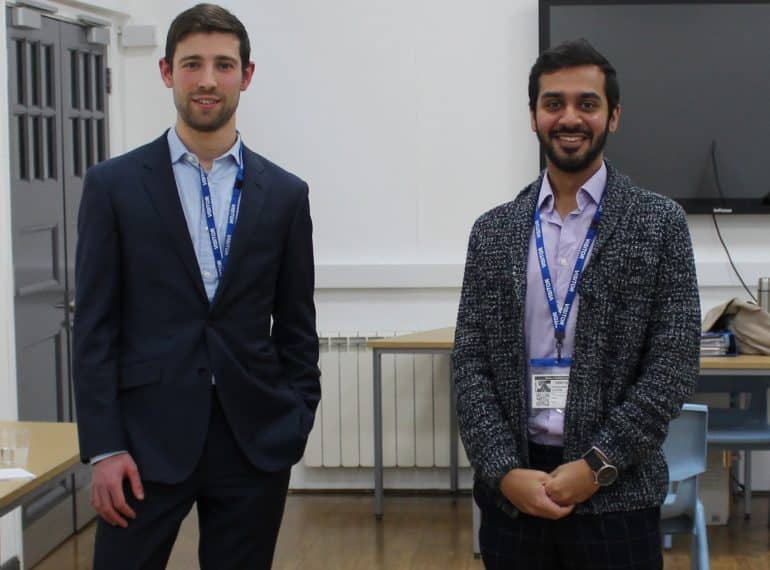
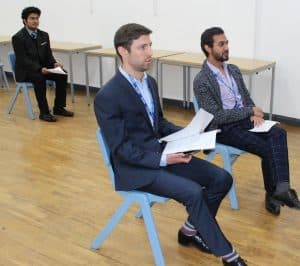 In their replies, they covered how legislation and attitudes have changed since they were at School, with neither feeling that being members of the LGBTQ+ community has held them back, although Arjun (OE 2001–2008) argued that the presence of “systemic homophobia” in society and in boys’ schools can lead to stigma, which in turn causes mental health issues.
In their replies, they covered how legislation and attitudes have changed since they were at School, with neither feeling that being members of the LGBTQ+ community has held them back, although Arjun (OE 2001–2008) argued that the presence of “systemic homophobia” in society and in boys’ schools can lead to stigma, which in turn causes mental health issues.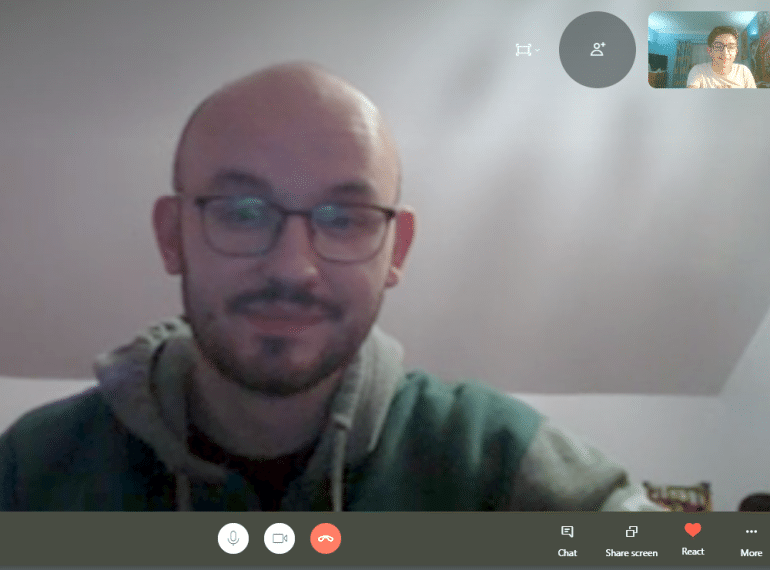
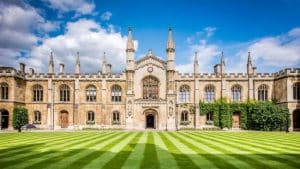 Among those paired together for the mock interviews were Zac Howlett-Davies (OE 2006–2013, pictured) and Year 13’s Zeke Essex, who is applying to read Modern Languages at Corpus Christi, Cambridge. Zac, who read Modern Languages at Durham, uses his French and German on a daily basis in his role in European copyright licensing for printed music publisher Hal Leonard Europe.
Among those paired together for the mock interviews were Zac Howlett-Davies (OE 2006–2013, pictured) and Year 13’s Zeke Essex, who is applying to read Modern Languages at Corpus Christi, Cambridge. Zac, who read Modern Languages at Durham, uses his French and German on a daily basis in his role in European copyright licensing for printed music publisher Hal Leonard Europe.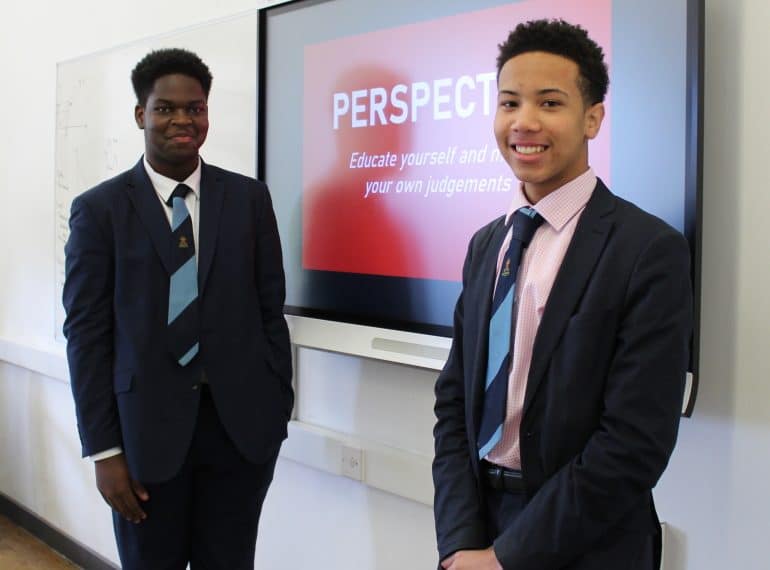
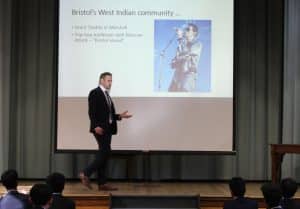 School Vice-Captains Thomas Mgbor and Ayodimeji Ojelade, of Year 13, have been speaking in assemblies at the School, while teachers have also led assemblies and the academic departments are uploading resources to the eQE digital learning platform throughout the month, promoting discussion and awareness in all the subject areas. Pictured here is a Year 12 assembly on Black History Month themes led by Head of Year Simon Walker.
School Vice-Captains Thomas Mgbor and Ayodimeji Ojelade, of Year 13, have been speaking in assemblies at the School, while teachers have also led assemblies and the academic departments are uploading resources to the eQE digital learning platform throughout the month, promoting discussion and awareness in all the subject areas. Pictured here is a Year 12 assembly on Black History Month themes led by Head of Year Simon Walker.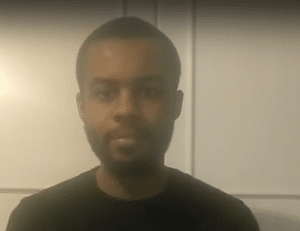 In his video for the younger boys, Ifeanyi began by introducing himself, saying that although his family originally came from Nigeria, he has lived in the UK for his whole life. He recounted his personal history of the “hurtful” comments he received as a teenager, as others questioned his love for the performing arts (including debating, public speaking and acting). “In my teenage years, I became aware of the fact that this choice of passions was unusual for young, black men like me and I was constantly reminded of this by my peers. At the time, I was often called an ‘oreo’, or asked why I didn’t act like a real black guy.” (Merriam-Webster dictionary defines ‘oreo’ as a ‘usually disparaging’ term meaning ‘a black person who adopts the characteristic mentality and behaviour of white middle-class society’.)
In his video for the younger boys, Ifeanyi began by introducing himself, saying that although his family originally came from Nigeria, he has lived in the UK for his whole life. He recounted his personal history of the “hurtful” comments he received as a teenager, as others questioned his love for the performing arts (including debating, public speaking and acting). “In my teenage years, I became aware of the fact that this choice of passions was unusual for young, black men like me and I was constantly reminded of this by my peers. At the time, I was often called an ‘oreo’, or asked why I didn’t act like a real black guy.” (Merriam-Webster dictionary defines ‘oreo’ as a ‘usually disparaging’ term meaning ‘a black person who adopts the characteristic mentality and behaviour of white middle-class society’.)
 The photo shows him with Professor Nicola Strickland, past President of the Royal College of Radiologists and one of his consultants when he trained in radiology at Imperial.
The photo shows him with Professor Nicola Strickland, past President of the Royal College of Radiologists and one of his consultants when he trained in radiology at Imperial. He has been pleased to see leavers in recent years take up offers at US and Canandian universities, including, most recently,
He has been pleased to see leavers in recent years take up offers at US and Canandian universities, including, most recently,